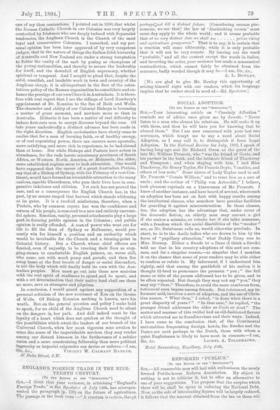SOCIAL ADOPTION.
[To THE EDITOR OF THE " SPECTATOR."] Sin,—Your interesting article on " Cousinly Affection " reminds me of advice once given me by Jowett " Never listen to a man who abuses his relations. He will make it up with them, and then he will hate you for knowing that he abused them." But I am now concerned with your last two sentences, which tempt me to say a word about Social Adoption, as I may call it, to distinguish it from Legal Adoption. In the National Review for July, 1893, I speak of . having long ago met Sir Richard Owen as the guest of the late Mr. William Prescott, who "was the friend of Grote, and his partner in the bank, and the intimate friend of Thackeray and Tennyson ; and when staying with him, I met Miss Thackeray, Sir Henry Taylor, Sir Francis Doyle, Venables, and others of less note." Some nieces of Lady Taylor used to call Mr. Prescott "Cousin William," and to treat him as a sort of uncle ; and the author of " Philip von Artevelde," I believe, took pleasant reprisals on a kinswoman of Mr. Prescott. I know of another instance, and have heard,of several, where such an adoption has been set on foot with happy results among the intellectual classes, who somehow have peculiar facilities for guarding it against misconstruction. In those classes, too, the adoption has the advantage that, under cover of the domestic fiction, an elderly man may correct a girl if she makes a mistake, or rebuke her if she talks nonsense, with a freedom which the social disabilities of the " weaker" sox, as Mr, Swinburne calls us, would otherwise preclude. In short, he is to the docile ladies who are drawn to him by the force of " pupillary attraction," what Daddy Crisp was to Miss Burney. Either a Swede br a Dane (I think a Swede) told me that in his country adoptions of this sort are com- mon, and for a singular reason,—so singular that I mention it on the chance that some of your readers may be able either to confirm or refate it. My informant, if I understood him rightly, said that among the gentlefolk of his nation it is thought ill-bred to pronounce the pronoun " you ; " the fall name or title of the person addressed has to be given, and to be often repeated. But though they may not say " you," they may say "thou." Therefore, to avoid the more cumbrous form, tutoientent soon begins among friends. But tutoiement, my in- formant said, involves a sort of adoption, and the use of Chris- tian names. " What then," I asked, " is done when there is a great disparity of years P " " In that case," he replied, " the younger friend addresses the elder as Uncle or Aunt." The matter and manner of this recital had an old-fashioned flavour which attracted me to Scandinavians and their ways. Indeed, I have come to the conclusion that, of the Continental nationalities frequenting foreign hotels, the Swedes and the Danes are next perhaps to the Dutch, those with whom a quiet Englishman is likely to have most in common.—I am,
Hotel Sonnenberg, Engelberg, Tidy 10th.

































 Previous page
Previous page